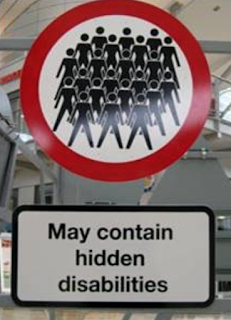Disability: To some it identifies what's wrong in the world, to others it represents what's wrong with themselves.
In the summer of 2017 I hosted an event for the Business Disability Forum in London. Below is the significantly modified speech I made there. It's a thought piece really, me trying to work something out. It got people talking and I'd love to hear what you think.
Hello, my name is Simon Minty, I am your host this evening. If you don’t know me, I’ve been an associate to the Business Disability Forum for twenty years.
 |
| Asda toilet sign - disability is very broad these days but have those identifying as so, kept pace? |
After several years in banking, I became professionally involved in disability equality. Luckily for me, the changes needed were pretty clear plus there was new equality legislation to help. Skilled, knowledgable and confident people, (many of whom had visible impairments and identified as disabled) advised on how things could improve. If you were around in the early noughties, you had legally enforceable rights and were part of the conversation and informed the plan.
It wasn't all rosey. Then as now, a lot of disabled people (legally at least) prefer to keep quiet, they're embarrassed and don't want to be treated differently. The law didn't even come in to it. More significantly, they didn't see themselves the same as those who used a wheelchair or a guide dog. They were something separate and different.
 |
| Many people have conditions that are a disability under the law but the condition is not visible. |
It's hard to give a straight answer. I think there is but it's complex and nuanced. It might be a perception of the self, a feeling, noticing you might be treated differently. Or, you behave differently to fit in. It's knowing you think about something that no one else does (except for those with exactly the same thing who get it instinctively). I think the fear of a loss of independence is part of it.
Why am I asking what do we have in common? Does it matter?
 |
| Is it a horse or a zebra? |
In the past twenty years, for some the word 'disability' helped identify barriers. Now some reject it, it's not about them. In the 90s, the word 'handicapped' was replaced by 'disability'. We may move on to a new word but is the word is the main issue? To some it identifies what's wrong in the world, to others it represents what's wrong with themselves. Can Harry Potter save us here? In the books, characters say 'He Who Must Not Be Named' as they were scared. (Spoiler alert) Harry Potter was one of the few who did say the name 'Voldermort' and Harry was the one who defeated him. I think it's a state of mind more than a word. I worry we may be setting ourselves adrift in to individual units. We must allow for our individuality, but I think finding, celebrating a commonality is desirable too.
I hope amongst the many challenges facing us in this field of work, we continue with one of the aims of the Business Disability Forum, to allow people to be themselves at work or out living their lives, to reduce the stigma of disability, but not to run away from it.
Business Disability Forum is unique, we’re unique, let’s not be nervous, let’s be proud.



